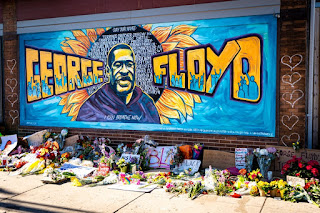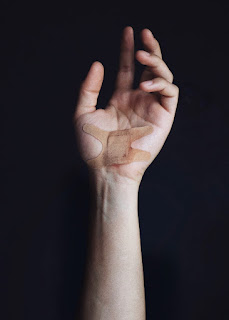Black Lives Matter - More Than You Realise
Should we really be surprised at the intensity of reaction to the ‘apparent’ murder of George Floyd? I use the word apparent deliberately because, whilst the policeman involved has been charged, he has not yet been convicted of murder. And that is a vital distinction. The claim is that a massive injustice has been committed and that this is indicative of systemic injustice against black people. From the video footage we have seen of the incident, it seems fairly clear that a crime has been committed. But I do not believe that we can call it injustice unless the wheels of justice - police investigation, trial by judge and jury, conviction or acquittal, and sentencing - fail to turn.
In fact, it seems to me that uproar at this stage reflects a different kind of injustice which has become increasingly common in our media driven society. It is the injustice of mob rule. If enough people congregate to protest the police will make a ‘tactical’ decision not to intervene, despite current legal restrictions on the number of people who are allowed to gather. If enough people hold to a point of view it becomes the de facto truth. We have forgotten that in law, a person is to be considered innocent until convicted, and have the right to appropriate legal counsel and defence, regardless of how heinous and obvious the crime is.
I am not defending the white policeman. Nor am I ignorant or dismissive of the prejudices that some (not all) white people hold against black people. But I am not convinced that real justice can be attained by dismantling the whole justice system and undermining the very principles of justice it is built on. Black lives do matter. And as an oft oppressed minority that needs to be spelled out, specifically. But justice matters - and that has to be said too.
I believe that George Floyd’s family agree with this. Addressing a gathered crowd of protesters Floyd’s brother Terrence spoke out:
“I understand you all upset but if I’m not over there wilding out,
if I’m not over here blowing up stuff, if I’m not over here messing up my
community, then what are y’all doing? What are y’all doing?
Y’all doing nothing, because that’s going to bring my brother back at all”.
He went on to insist:
“My family is a peaceful family. My family is God fearing”.
In Terrence’s analysis, the damage done by protesting mobs rarely impacts privileged white communities. It causes disproportionate damage to the black communities. It adds self-inflicted wounds to those inflicted by others. So Terrence encouraged people not to go out and destroy things but instead to go out at election time.
“Let’s stop thinking that our voice don’t matter and vote”.
Lay hold of political equality by exercising your political voice. Obtain justice within the justice system. Because the kind of equality gained by undermining democracy is not the kind of equality that black people need or anyone else wants. Undermining the political system does create a kind of equality. It means that no one will have a right to speak - black or white. Undermining the justice system does create a kind of equality. It means that no one will have justice - black or white. It is like saying “If I can’t have it then no one will have it”. And in the end that is not what black people need. Because black lives matter more than that.
What black people need is an equal political voice and equal legal standing before the law - equal to whites, and Asians and Latinos and everyone else.. In other words, black people need to use the system to say “We have an equal right to the political privileges you have”. And white people need to use the system to say “Black people have an equal right to the political privileges that we have”. I realise that in many situations the dice is loaded to roll ‘white win-black lose’ more often than ‘black win-white lose’. But surely the goal of change should be a win-win solution, not a lose-lose solution. It is clear that the Floyd family would like George to become the figure-head of a peaceful campaign for real justice, not for a campaign of unjust mob rule.
It interests me that Terrence Floyd traced his commitment to justice and democracy back to the fact that he is from a “God fearing” family. Many of the principles of justice which western societies take for granted bear the influence of a strong Christian heritage. The Christian God is a just God, a God who is committed to justice. He does not favour white people over black, nor black over white. He will take the cause of those who are treated unjustly - black and white - over against those who commit injustice - black and white. Often He grants vindication in this world, through the legal and political systems working at their best. But where injustice is allowed to prevail in this world, He will hold people to account in the next. So Jesus taught His disciples
“Do not fear those who kill the body but cannot kill the soul.
Rather fear him who can destroy both soul and body in hell” (Matthew 10:28).
According to the Bible, we should all - victims and perpetrators of whatever race - direct our behaviour by the fact that when we die we will face God’s judgment - and there will be no injustice there. That thought can - should! - strike terror in the hearts of people with a guilty conscience. But Christians have learned to rejoice in God’s commitment to justice as a good thing. This is not because we are less guilty than other people. We have all sinned. By God’s standards I am as bad as you - probably worse. We rejoice because God has found a way to take away our guilt without breaking down the divine justice system. This is how:
Jesus lived an objectively guilt-free life. It was not just that He did not feel guilty; He had no guilt. But He was condemned in a kangaroo court, suffering the worst miscarriage of justice that human hands have ever accomplished. The world’s most guilt-free man was treated as the world’s most guilty man. Yet, incomprehensibly, the Bible says that God was over-ruling and using even this great evil. Jesus voluntarily accepted this destiny as the path by which He would experience the full punishment deserved by other people’s sin. He was offering Himself as a ransom, a payment of the moral-debt that other people’s guilt has accumulated. As He was dying - suffocating not over several minutes but several hours - He prayed that the perpetrators of this worst injustice ever would be forgiven.
Through that act of humanity at its worst, we see God at His greatest. He has made Jesus the figure-head of a divine justice campaign, designed to establish peace between God and people. He did it in a such a way that He
“remains just whilst also justifying all who trust in Christ” (Romans 3:26).
He did it at great personal cost:
“God commends His love to us in that,
while we were still sinners,
Christ died for us” (Romans 5:8).
And He did it for people of all races, families, tribes, nations, no matter how guilty they have been. Because black lives matter far more than you think. They matter more to God than they do to the most vocal political activist. And white lives matter too. And Asian lives. And Latino lives. The value that God sets on human lives is the price He paid to establish this salvation:
“For God so loved the world that He gave His only begotten Son that
whoever believes in Him should not perish but have everlasting life” (John 3:16).




Comments
Post a Comment